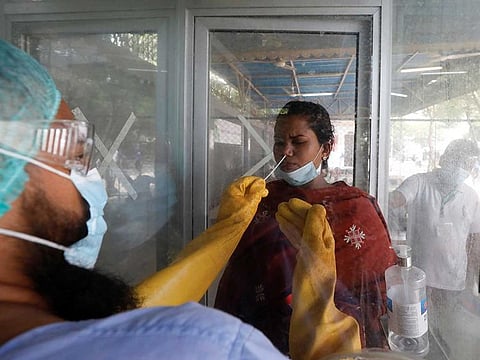Pakistan at risk of mental health crisis due to COVID-19
Study finds 75% Pakistani adults facing stress during the pandemic

Islamabad: Pakistani health experts are concerned about the mental health effects of the coronavirus – a threat that remained largely ignored as the country prioritised physical health to treat those infected with the virus.
Nearly three out of four Pakistani adults (75%) are suffering from moderate or high levels of stress during the coronavirus pandemic and nearly one in three are experiencing moderate or severe anxiety, according to initial findings of a mental health study conducted by Aga Khan University (AKU).
Risk of mental health crisis
Pakistan is at risk of a mental health crisis during the pandemic, the findings suggest. “Policymakers must prioritise psychosocial interventions to limit the chances of long-lasting scars on our mental health,” said Maryam Lakhdir, the study’s principal investigator. Those suffering from anxiety and stress are especially vulnerable to advanced mental health disorders such as depression, she added.
Top causes of anxiety during pandemic
Researchers from AKU’s department of community health sciences (CHS) conducted the survey online during April and May (study’s first phase) using validated screening tools. There were a total of 373 respondents and more than 90 per cent were from Sindh and Punjab.
The top three causes of anxiety and stress among the Pakistani people include fear of contracting the virus, financial losses during the pandemic and losing a loved one to COVID-19. People “were more concerned about their loved ones catching the disease with nearly eight out of ten respondents (76%), feeling a lot of fear or extreme fear of those close to them falling ill,” the findings said. Only four of ten respondents (36%) reported a lot of fear or extreme fear about catching the virus themselves. Some of the symptoms of psychological stress include stress, anger, low mood, insomnia, irritability, emotional exhaustion and depression.
Mental health and social stigma
“The pandemic has exposed our social and economic vulnerabilities and created widespread uncertainty in society,” said Professor Sameen Siddiqi, the department head. “If left unchecked, stress associated with COVID-19 can lead to distress that can lead to disease.”
Sabahat Naseem, a clinical psychologist, linked the pandemic stress with the social stigma. “Several people who are contracting the virus are keeping it hushed out of fear of being left on their own. This adds to the stress and anxiety that they are already going through due to their illness,” she told Gulf News.
WhatsApp rumours and misinformation fueling stress
Misinformation, rumours and conspiracy theories are also feeding the fear and anxiety that people are experiencing in quarantine. The AKU study found a high correlation “between exposure to rumours via WhatsApp and anxiety or stress” as more than eight out of ten respondents suffering from the two stress conditions were using this social media platform and those who checked news more frequently reported higher level of and stress, the study noted. “Misinformation, conspiracy theories, and rumour-mongering are likely to lead to mental health issues during the pandemic,” said Dr Romaina Iqbal, the lead of CHS’s non-communicable diseases section.
Sabahat also pointed out that “media has been a source of severe mental stress especially for the older adults.” The surge of constant stressful news on “Pakistani TV channels and social media, baseless theories, and WhatsApp rumours have taken a great toll on people’s mental health which affects their immunity and renders them even more vulnerable.” She also cited a lack of trust in the officials as one of the causes of increasing anxiety among people.
The researchers will continue the study till the end of August, after which the final findings will be shared, offering an insight into Pakistan’s mental health situation.
More than 60% COVID patients in Pakistan recovered
Pakistan’s daily coronavirus tally dropped to below 2,000 for the first time after a month, the health officials said. The country recorded 2,165 new cases over the past 24 hours compared to an average 5,000 cases during last two months.
More than 172,810 people of 255,700+ infected have recovered from coronavirus in Pakistan, indicating that the recovery rate across Pakistan now stands at 67 per cent. At least 2,078 of those infected are in critical condition. The country has recorded 5,386 deaths.
Sign up for the Daily Briefing
Get the latest news and updates straight to your inbox



